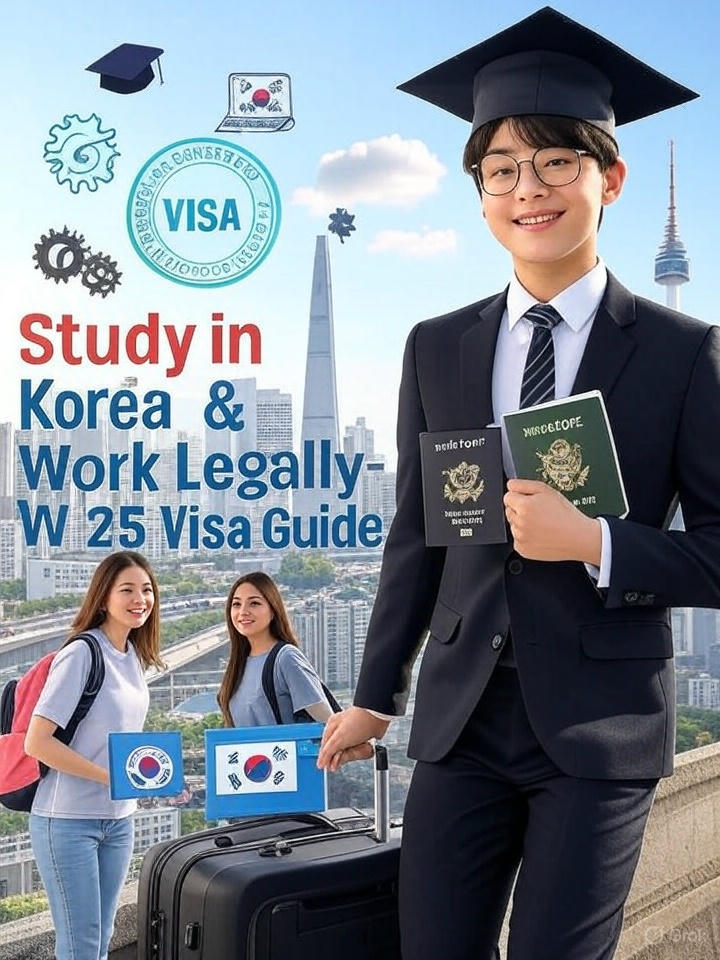Job Opportunities in South Korea on Study-Based Visa & the Visa Process (2025 Guide)
Introduction
South Korea has emerged as a global hub for higher education and career development. With its high-quality universities, innovative industries, and a thriving job market, South Korea attracts thousands of international students each year. But what many don’t realize is that a study-based visa in South Korea can also open the door to excellent job opportunities.
In this article, we’ll explore in-depth how you can work in South Korea on a student visa, the types of jobs available, industries hiring international students, part-time and post-study work options, and a step-by-step student visa process.
Let’s uncover why South Korea could be your ideal destination for both education and career growth.

✅ Why Choose South Korea for Study and Work?
South Korea is not just famous for K-pop and tech giants like Samsung and Hyundai; it is also known for:
- Affordable tuition fees compared to the U.S. or U.K.
- Government scholarships like GKS (Global Korea Scholarship)
- Safe, modern cities and excellent public infrastructure
- A growing demand for skilled foreign professionals
Most importantly, D-2 (student) visa holders are legally allowed to work part-time during their studies and can apply for full-time jobs post-graduation.
🎓 Types of Student Visas in South Korea
South Korea issues multiple types of student visas. The most relevant ones are:
- D-2 Visa (Study in University)
- For students pursuing undergraduate, postgraduate, or research programs.
- Eligible for part-time work during the academic term and full-time during holidays.
- D-4 Visa (Language Training Visa)
- For students enrolled in Korean language training programs.
- Part-time work is allowed after completing 6 months of study.
💼 Job Opportunities While Studying in South Korea
🔹 1. Part-Time Jobs (While on D-2 or D-4 Visa)
As a student, you can work up to 20 hours per week (Monday to Friday) and unlimited hours on weekends/holidays. Popular part-time jobs include:
- English Tutoring or Assistant Teaching
- Cafe/Restaurant Staff (Barista, Server)
- Retail and Convenience Stores
- Translation/Interpretation
- Research Assistant/Intern in University Labs
✅ Why Choose South Korea for Study and Work?
South Korea is not just famous for K-pop and tech giants like Samsung and Hyundai; it is also known for:
- Affordable tuition fees compared to the U.S. or U.K.
- Government scholarships like GKS (Global Korea Scholarship)
- Safe, modern cities and excellent public infrastructure
- A growing demand for skilled foreign professionals
Most importantly, D-2 (student) visa holders are legally allowed to work part-time during their studies and can apply for full-time jobs post-graduation.
🎓 Types of Student Visas in South Korea
South Korea issues multiple types of student visas. The most relevant ones are:
- D-2 Visa (Study in University)
- For students pursuing undergraduate, postgraduate, or research programs.
- Eligible for part-time work during the academic term and full-time during holidays.
- D-4 Visa (Language Training Visa)
- For students enrolled in Korean language training programs.
- Part-time work is allowed after completing 6 months of study.
💼 Job Opportunities While Studying in South Korea
🔹 1. Part-Time Jobs (While on D-2 or D-4 Visa)
As a student, you can work up to 20 hours per week (Monday to Friday) and unlimited hours on weekends/holidays. Popular part-time jobs include:
- English Tutoring or Assistant Teaching
- Cafe/Restaurant Staff (Barista, Server)
- Retail and Convenience Stores
- Translation/Interpretation
- Research Assistant/Intern in University Labs
💡 Note: You must get permission from your university and immigration office before starting part-time work.

🏢 Post-Graduation Job Opportunities in South Korea
After graduating, you can apply for a D-10 visa (Job-Seeking Visa) which allows you to stay in South Korea for 6-12 months to look for a job. Once employed, you can transition to a working visa (E-series) depending on your job type.
🔹 Top Industries Hiring International Graduates:
- Information Technology & Software Development
- Engineering & Manufacturing (Automobile, Electronics)
- Research and Development (R&D)
- Education (English Teaching)
- Finance & Accounting
- Biotechnology & Pharmaceuticals
- Korean Companies Going Global (Marketing, Sales)
🔹 Popular Employers:
- Samsung
- LG Electronics
- Hyundai Motors
- Naver
- Kakao Corp
- SK Hynix
- Startups in Pangyo Techno Valley
🔁 Internships and Work Placements
Many South Korean universities have tie-ups with companies offering internships to foreign students. Some programs offer paid internships, which can lead to permanent job offers.
Recommended Programs with Work Placements:
- Seoul National University – Global Internship Program
- KAIST – Research Internships
- Yonsei University – Global Career Tour
🗂️ Visa Process for Studying and Working in South Korea
✅ Step-by-Step Guide for Student Visa (D-2):
Step 1: Get Admission into a Korean University
- Choose a university approved by the Korean Ministry of Education.
- Receive your Certificate of Admission (CoA).
Step 2: Prepare Required Documents
- Valid Passport
- Visa Application Form
- Passport-size Photos
- Admission Letter
- Proof of Financial Support (Bank Statement showing at least $10,000)
- Health Insurance
- Academic Certificates (High School/Degree Transcripts)
- Tuition Fee Payment Receipt
Step 3: Apply for D-2 Visa at Korean Embassy
- Book an appointment with your nearest Korean embassy.
- Submit documents and pay visa fee.
- Wait 2-4 weeks for visa processing.
Step 4: Enter South Korea & Register
- Enter Korea with a valid D-2 visa.
- Within 90 days, apply for Alien Registration Card (ARC) at the local immigration office.
🔄 Transitioning to Work Visa (Post-Study)
After completing your studies:
- Apply for D-10 Visa (Job-Seeking Visa):
- Valid for 6 months (can be extended to 12 months).
- Allows you to look for full-time jobs, attend interviews, and do internships.
- Convert to E-Series Work Visa Once Hired:
Visa Type | Description |
E-1 | University Professor |
E-2 | Foreign Language Instructor |
E-3 | Research |
E-4 | Technological Instructor |
E-5 | Professional Employment |
E-7 | Special Occupation (Most common for international grads) |
💼 Tip: Many companies prefer Korean language proficiency (TOPIK Level 3+) but it’s not mandatory for global firms.

🧾 Part-Time Work Permit Process (D-2 Visa Holders)
To work legally as a student:
- Complete at least 6 months of study (if on D-4).
- Get a recommendation from your university.
- Visit immigration with:
- Application form
- ARC card
- University approval letter
- Job offer letter from employer
- Receive your Sajo (Work Permit Letter)
📈 South Korea Job Market Trends (2025)
According to recent reports:
- Demand for AI, Robotics, and IT skills is growing rapidly.
- South Korea plans to ease immigration to fill labor shortages in tech and healthcare.
- Government programs are in place to support foreign graduates with job matching.
🌍 Resources to Find Jobs in South Korea as a Student or Graduate
Popular Job Portals:
- Job Korea (jobkorea.co.kr)
- Saramin (saramin.co.kr)
- LinkedIn Korea
- WorkNet (Government Portal)
- HiKorea.go.kr – Immigration and Work Info
- GlobalInjae Center – Job fairs for foreigners
📚 Tips for International Students Seeking Jobs
- Learn Korean Language – Even basic proficiency can set you apart.
- Attend Career Fairs – Held at major universities every semester.
- Build a Network – Join student clubs, Korean-foreigner events.
- Prepare Korean-Style Resume (이력서) & Cover Letter
- Practice Interviews in Korean and English
🧳 Conclusion
South Korea offers excellent job opportunities for international students, not only during their study period but also after graduation. With a strategic approach, the right visa, and networking, you can build a successful career in Korea’s fast-paced economy.
Whether you’re in IT, engineering, education, or business, South Korea welcomes global talent. If you’re planning to study in Korea in 2025, now is the best time to start preparing!
